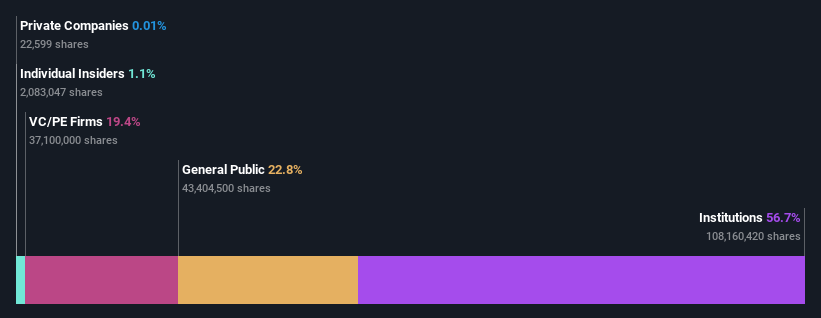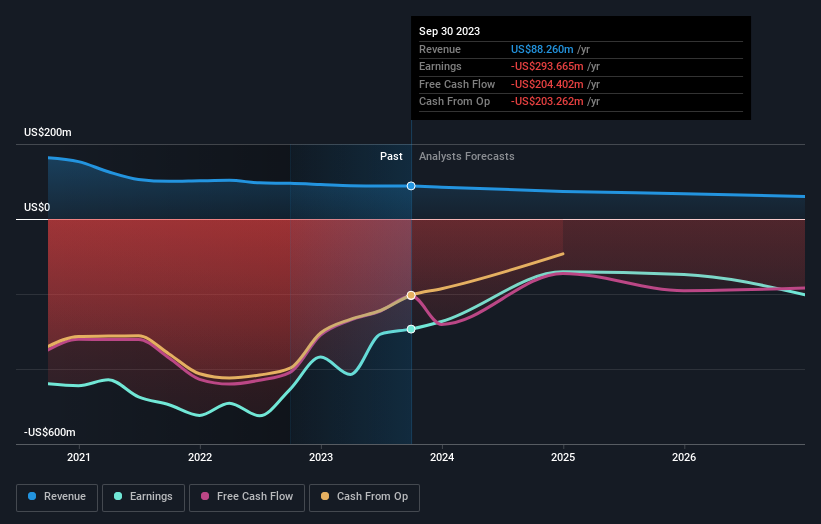Stock Analysis
- United States
- /
- Pharma
- /
- NasdaqCM:NKTR
Positive week for Nektar Therapeutics (NASDAQ:NKTR) institutional investors who lost 81% over the past year

Key Insights
- Significantly high institutional ownership implies Nektar Therapeutics' stock price is sensitive to their trading actions
- The top 11 shareholders own 51% of the company
- Insiders have sold recently
To get a sense of who is truly in control of Nektar Therapeutics (NASDAQ:NKTR), it is important to understand the ownership structure of the business. The group holding the most number of shares in the company, around 57% to be precise, is institutions. Put another way, the group faces the maximum upside potential (or downside risk).
Institutional investors would probably welcome last week's 14% increase in the share price after a year of 81% losses as a sign that returns may to begin trending higher.
In the chart below, we zoom in on the different ownership groups of Nektar Therapeutics.
Check out our latest analysis for Nektar Therapeutics

What Does The Institutional Ownership Tell Us About Nektar Therapeutics?
Institutional investors commonly compare their own returns to the returns of a commonly followed index. So they generally do consider buying larger companies that are included in the relevant benchmark index.
As you can see, institutional investors have a fair amount of stake in Nektar Therapeutics. This can indicate that the company has a certain degree of credibility in the investment community. However, it is best to be wary of relying on the supposed validation that comes with institutional investors. They too, get it wrong sometimes. If multiple institutions change their view on a stock at the same time, you could see the share price drop fast. It's therefore worth looking at Nektar Therapeutics' earnings history below. Of course, the future is what really matters.

Institutional investors own over 50% of the company, so together than can probably strongly influence board decisions. We note that hedge funds don't have a meaningful investment in Nektar Therapeutics. RA Capital Management, L.P. is currently the largest shareholder, with 9.8% of shares outstanding. Deep Track Capital, LP is the second largest shareholder owning 9.6% of common stock, and The Vanguard Group, Inc. holds about 6.3% of the company stock.
A closer look at our ownership figures suggests that the top 11 shareholders have a combined ownership of 51% implying that no single shareholder has a majority.
While studying institutional ownership for a company can add value to your research, it is also a good practice to research analyst recommendations to get a deeper understand of a stock's expected performance. Quite a few analysts cover the stock, so you could look into forecast growth quite easily.
Insider Ownership Of Nektar Therapeutics
While the precise definition of an insider can be subjective, almost everyone considers board members to be insiders. The company management answer to the board and the latter should represent the interests of shareholders. Notably, sometimes top-level managers are on the board themselves.
Insider ownership is positive when it signals leadership are thinking like the true owners of the company. However, high insider ownership can also give immense power to a small group within the company. This can be negative in some circumstances.
We can report that insiders do own shares in Nektar Therapeutics. In their own names, insiders own US$1.2m worth of stock in the US$111m company. It is good to see some investment by insiders, but we usually like to see higher insider holdings. It might be worth checking if those insiders have been buying.
General Public Ownership
The general public, who are usually individual investors, hold a 23% stake in Nektar Therapeutics. While this group can't necessarily call the shots, it can certainly have a real influence on how the company is run.
Private Equity Ownership
With a stake of 19%, private equity firms could influence the Nektar Therapeutics board. Some investors might be encouraged by this, since private equity are sometimes able to encourage strategies that help the market see the value in the company. Alternatively, those holders might be exiting the investment after taking it public.
Next Steps:
It's always worth thinking about the different groups who own shares in a company. But to understand Nektar Therapeutics better, we need to consider many other factors. Case in point: We've spotted 2 warning signs for Nektar Therapeutics you should be aware of.
But ultimately it is the future, not the past, that will determine how well the owners of this business will do. Therefore we think it advisable to take a look at this free report showing whether analysts are predicting a brighter future.
NB: Figures in this article are calculated using data from the last twelve months, which refer to the 12-month period ending on the last date of the month the financial statement is dated. This may not be consistent with full year annual report figures.
Valuation is complex, but we're helping make it simple.
Find out whether Nektar Therapeutics is potentially over or undervalued by checking out our comprehensive analysis, which includes fair value estimates, risks and warnings, dividends, insider transactions and financial health.
View the Free AnalysisHave feedback on this article? Concerned about the content? Get in touch with us directly. Alternatively, email editorial-team (at) simplywallst.com.
This article by Simply Wall St is general in nature. We provide commentary based on historical data and analyst forecasts only using an unbiased methodology and our articles are not intended to be financial advice. It does not constitute a recommendation to buy or sell any stock, and does not take account of your objectives, or your financial situation. We aim to bring you long-term focused analysis driven by fundamental data. Note that our analysis may not factor in the latest price-sensitive company announcements or qualitative material. Simply Wall St has no position in any stocks mentioned.
About NasdaqCM:NKTR
Nektar Therapeutics
Nektar Therapeutics, a biopharmaceutical company, focuses on discovering and developing medicines in the field of immunotherapy in the United States and internationally.
Excellent balance sheet and slightly overvalued.

